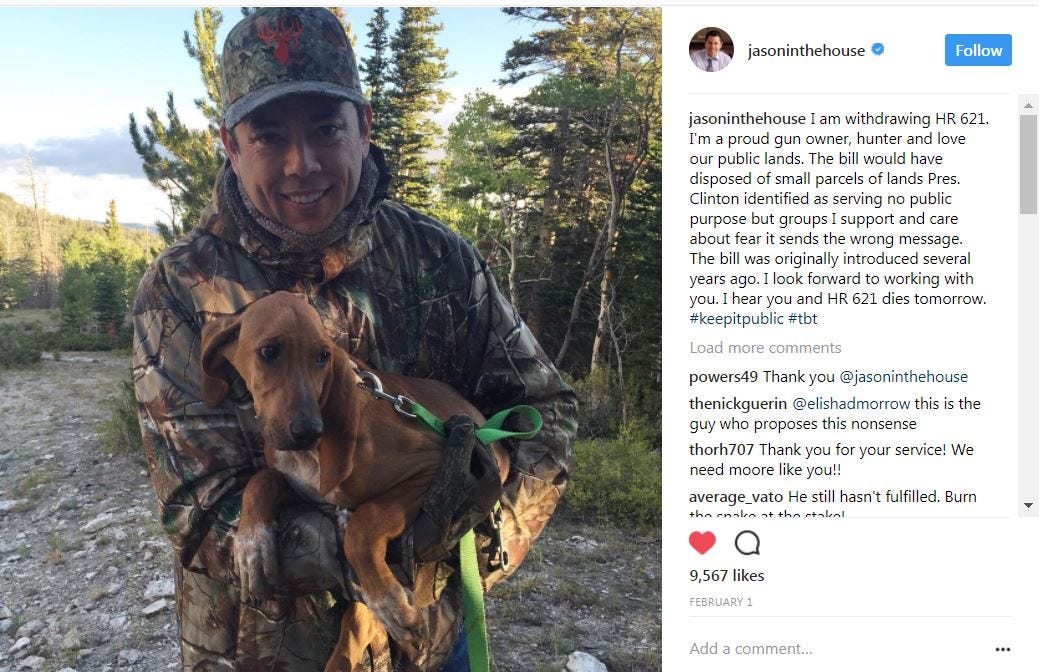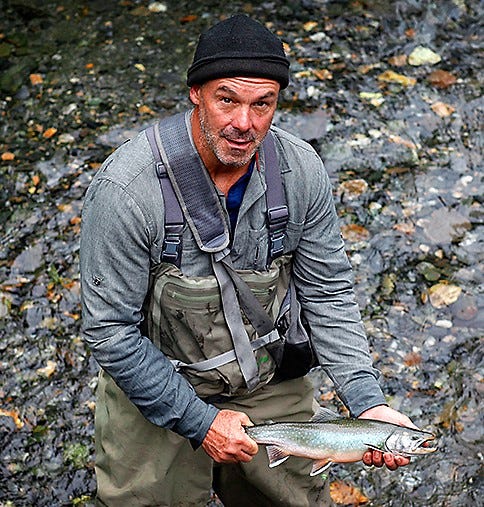The Land Privatization Movement Is Alive and Well
By Hal Herring
The
stories come in, one after another, about the “retreat of the land
grabbers.” The latest is a piece by the good writer and journalist Jimmy
Tobias, called “Another Loss for the Land-Grab Campaign,” May,
2017 issue of the Pacific Standard Magazine. Tobias notes that Nevada’s
Congressional Representative Mark Amodei, one of the leaders of the
anti-public lands movement had withdrawn his bill HR 1484, called the
Honor the Nevada Enabling Act (a strange name for his bill since the
actual Nevada Enabling Act of 1864 clearly states that all undistributed
public lands would remain in the hands of the federal government, but
no history, no agreement, no fact, ever stands in the way of those who
are obsessed with taking public lands for themselves and their masters).
Amodei’s failed bill called for the transfer of an initial 7.3 million
acres owned by the American public, with millions more acres to follow,
“on request of county or state governments.”
In
February of 2017 newspapers across the nation covered the collapse of
Utah Representative Jason Chaffetz’ H.R. 621, a bill that commanded the
Secretary of the Interior to sell-off over 3.3 million acres of public
land, after a concerted outcry of rage from hunting and fishing
conservation groups. Chaffetz wrote on social media,
“I am withdrawing HR 621. I’m a proud gun owner, hunter and love our
public lands. The bill would have disposed of small parcels of lands
Pres. Clinton identified as serving no public purpose but groups I
support and care about fear it sends the wrong message…”

The wrong message, indeed.
Do Not Be Fooled
Even
as fishermen and hunters and other public lands advocates celebrate
what looks like a victory, the message of state control and
privatization of public lands is pounding away, powerful and alive as
ever, like the tell-tale heart in the old Edgar Allen Poe story of
murder and guilt. While the land grabbers may have made a strategic
withdrawal for the moment, there is no evidence- zero- that any of them
have changed their minds or their goals.
The land privatization movement is alive and well and led by well-funded and highly motivated groups like the American Lands Council
(whose campaign is called, shamelessly, “Free the Lands!” as if somehow
the lands where we fish and hunt and roam with our families- the lands
that are our birthright as American citizens- were somehow held in
bondage by evildoers). Utah state representative Ken Ivory, a former
director of the American Lands Council, told reporters that the takeover
of public lands by the states was “like having your hand on the lever
of a new Louisiana Purchase,” without ever noting that the original
Louisiana Purchase cost the US $15 million in gold (about $450 million
in today’s dollars) and a willingness to engage the Emperor Napoleon in
outright war, nor did he mention that the Treaty of Guadalupe Hidalgo,
under which Mexico ceded much of the rest of the West to the US, cost
millions in gold and uncounted lives on the battlefield. Rep. Ivory,
apparently, expects for Americans to simply give him and his cronies
these lands, bought with our own blood and treasure, for free.
The equally-well funded corporate front group the American Legislative Exchange Council
(ALEC) writes boilerplate bills that are then carried to state
legislatures and to Congress by willing or gullible lawmakers. ALEC
authored this doozy, called the “Disposal and Taxation of Public Lands
Act,” which says
“(1)
On or before December 31, 2014, the United States shall: (a) extinguish
title to public lands; and (b) transfer title to public lands to the
state.”
The
current Republican Party platform makes their plan absolutely clear,
saying, “It is absurd to think that all that acreage must remain under
the absentee ownership or management of official Washington. Congress
shall immediately pass universal legislation providing for a timely and
orderly mechanism requiring the federal government to convey certain
federally controlled public lands to states.”
The catchwords here are “state control” or “transfer the lands to the states.”
All
the available evidence and all historical precedence support the fact
that if federally-managed public lands are transferred into state
control, the lands will be sold. “Transfer to state control” is pure
con-man double-speak for inevitable privatization of our public lands.
This
movement to divest Americans of our public lands is based upon a
simple, grim arithmetic: our lands, from the smallest, most lush
National Forest in Mississippi to the tens of thousands of arid Western
acres managed by the Bureau of Land Management, represent the largest
and fattest cash cow left on the planet today. As the old-school
humorist Will Rogers once noted, “buy land, they aren’t making any more
of it.” Rogers, were he alive today, might say it differently: “If you
have millions of acres of lands that belong to all Americans, you better
make dang sure you know how best to keep it.” Because the hyenas are at
the gates, and they are hungry, and they are shameless.
How
can we keep our birthright, even as the population of the world in 2050
approaches 9 billion souls, and the population of our country- which
has more than doubled in the past fifty years- adds another 50 or 100
million or more? How can we make the irrefutable argument that these
lands’ highest purpose is to remain in public hands? How can we win this
battle for the future of our nation, and the natural landscapes, the
hunting and fishing and freedom that makes our country the envy of the
world?
First,
we must stop taking our public lands for granted. For decades many of
us seemed to take pleasure in bashing the federal agencies charged with
managing our public lands. Ranchers were furious at the BLM, loggers
railed against the US Forest Service, hunters resented road closures,
fishermen claimed that too much logging was ruining fisheries, mill
owners and loggers claimed that environmentalists had “locked them out”
of the forests. Environmentalists claimed that land managers were
destroying the very ecosystems they were charged with managing, by
prioritizing livestock, mining, or logging.
We
all thought that the public lands were always going to be there, and
that we had the luxury of complaining and ranting endlessly about their
management without offering concrete, collaborative solutions to the
conflicts. Now, we know that those conflicts, and that lack of
engagement on our part, are being used by the most venal among us to
convince us to simply give away our birthright.
Two,
we must recognize that the conflicts over public lands management are
real, and that anger over public lands management is, at least
sometimes, based on poor management decisions, top-down decision that
don’t reflect real conditions on the ground, real problems and lack of
knowledge, and/or a lack of adequate personnel in federal agencies. The
stereotypes of anti-federal fury sometimes have a basis in reality: yes,
environmentalists have almost certainly filed too many lawsuits, and
public land managers have indeed let loggers cut down too many trees, or
livestock grazers graze too many cows or sheep, in the wrong places at
the wrong times.
None
of this means that our public lands should be given away or sold. It
means we need to solve the conflicts, because the evidence is that
whatever outcome would arise from state control and/or privatization, it
wouldn’t be better than what we have now. The conflicts might end. But
that peace would come because there would be nothing left to argue over.
Three,
we as a people need to understand that the system of American public
lands is a cornerstone of our Republic, no less crucial than the Bill of
Rights, or the fiery and noble ideas in the Declaration of
Independence. The public lands were set aside, beginning in 1892, to
solve specific problems that had plagued and ruined lesser nations since
the dawn of civilization- soil erosion, overgrazing, loss of timber
resources, privatized water sources, silted river systems. The ecosystem
services these lands provide now are almost certainly incalculable on
any economic scale — the snowpack held in public trust in high
mountains, the floodwaters soaked up by the eastern and southeastern
forests, the healthy, soil-building grasslands in the arid west. Always,
the simple yet utterly unique notion of 640 million acres held in
common by every American is as critical to our future as any treasure
that we have, as critical as petroleum or natural gas or minerals (which
are also produced on public lands) or the notion of equal justice under
the law, or a an honest days’ wage for an honest days’ work. The
poorest among us has the same right to hunt elk on the Lewis and Clark
National Forest in Montana as a multi-billionaire. The richest among us
can suffer beneath the Nevada desert sun, or revel in the spring snow on
a Colorado peak, or hunt turkeys in the Sipsey Wilderness of Alabama,
without spending a dime of their fortune, and they can greet the rest of
us there, on a landscape that we all own together. It is as sane and
honest an approach to a world gone awry as the ideas and works of our
Founding Fathers, and keeping it intact is just as important to our
future.
Right
now, anti-public lands lawmakers are strangling federal land management
budgets, making on-the-ground work impossible, and making conflicts
with public land users inevitable. The same lawmakers then point to the
lack of effective management on our public lands and say “See, nothing
is getting accomplished, just as we said! Everyone is angry! This is why
we must get rid of your lands!”
When
the critical role of our public lands is understood by a majority of
Americans, pressure can be put upon Congress to prioritize funding for
federal land management agencies on a par with the importance of the
work they accomplish. As accomplishments mount, the current anti-public
lands firebrands in political offices will find themselves marooned in
irrelevancy, with a shrinking constituency of listeners, braying their
con-games at empty rooms.
None
of this is impossible. What have we been given? The world’s most
spectacular gift- a landscape vast enough to match the aspirations of
its people, quiet woods and raging waters, snowfields and deserts and
prairies replete with wildlife, room for roaming, for hunting, fishing
and teaching our children the verities of existence on this vibrant
planet. It is recorded in the 1906 American Historic Review that a lady
once asked Dr. Benjamin Franklin whether he and his colleagues had
created a monarchy, or a republic. Dr. Franklin responded, “A republic,
madam, if you can keep it.” The same can be said of our public lands- we
have inherited the freedom of some of the best ideas our forefathers
and mothers ever had- now we will find out if we are tough enough, smart
enough, far-sighted enough- to keep it.
Take action for your public lands today and tell your representatives public lands are not for sale.

Hal
Herring is an award-winning journalist and contributing editor at Field
and Stream magazine.has been writing about conservation, environment,
hunting and guns for the past twenty years, and is a contributing editor
at Field and Stream magazine. A lifelong outdoorsman, mountaineer,
hunter and fisherman, Hal is based in Augusta, Montana.

No comments:
Post a Comment